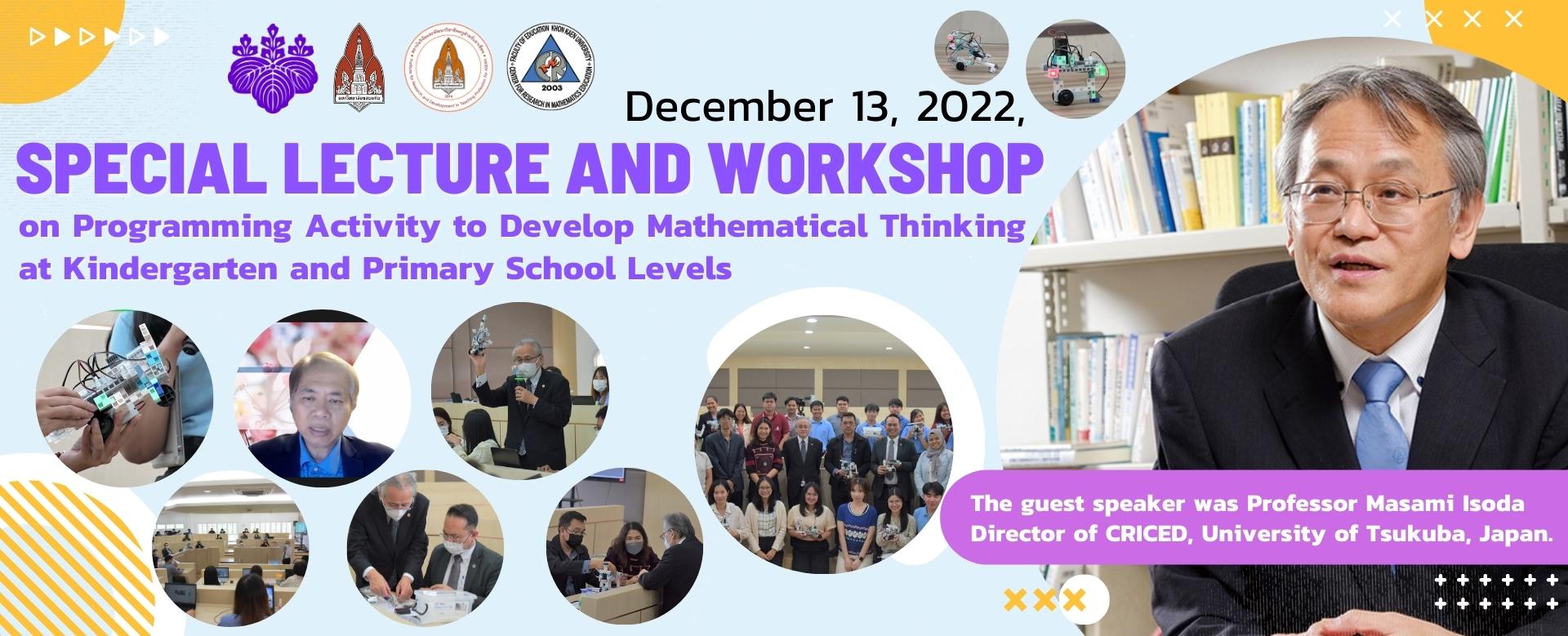

December 13, 2022

December 13, 2022, (Thailand time 0900 to 16.00 hours) – IRDTP for ASEAN Building Phase 2, Khon Kaen University – The IRDTP for ASEAN and CRME Khon Kaen University organized a one-day special lecture and workshop related to programming activity to develop mathematical thinking (higher-order thinking) for kindergarten and primary school students (SDG 4, OKR 1). The event was conducted in two modes of delivery, namely onsite and online. The guest speaker was Professor Masami Isoda, Director of CRICED, University of Tsukuba, Japan.
The event started with a welcoming speech given by the Vice President for Education and Academic Services and Acting Director of IRDTP for ASEAN, Associate Professor Dr. Maitree Inprasitha. In his welcoming speech, he emphasized the importance of programming thinking integrated with programming activities must replace traditional teaching across various subject matters and is very challenging (SDG 10). On the other hand, Professor Masami Isoda presented his special lecture mainly on the use of APEC and SEAMEO frameworks to design programming activities (SDG 4, OKR 1). Educational personnel, teachers, students, and interested individuals are encouraged to exchange their ideas in developing advanced mathematical thinking skills, particularly computational thinking (SDG 17). The transition of the APEC and SEAMEO framework into practice was introduced through these two sessions of the workshop in order to guide participants on how to apply it in their teaching activities without teaching computational language to kindergarten and primary school students (SDG 10, SDG 17).
A total of 54 participants comprised faculty members, academicians, school directors, and teachers from Santi Thamwittaya School and postgraduate students. Besides, 17 scholars attended the workshop online. In Phase 1 of the workshop, participants were trained on problem posing in mathematics classrooms for learning visible programing language. In Phase 2 of the workshop, participants were trained in the application of robotic programming to promote mathematical thinking (SDG 4).
This workshop has successfully provided ample opportunities for participants to exchange their ideas regarding advanced mathematical thinking skills development, especially computational thinking. These hands-on practices during the workshop have provided guidelines for participants in organizing activities, good teaching practices, and a great opportunity to gain knowledge and know the direction on deploying appropriate teaching strategies in the current changing educational world.
.jpg)
.jpg)
.jpg)
.jpg)
.jpg)
.jpg)
.jpg)
.jpg)
.jpg)
.jpg)
.jpg)
.jpg)
.jpg)
.jpg)
.jpg)
.jpg)
.jpg)
.jpg)
.jpg)
.jpg)
.jpg)
.jpg)
.jpg)
.jpg)
.jpg)
.jpg)
.jpg)
.jpg)
.jpg)
.jpg)
.jpg)
.jpg)
.jpg)
.jpg)
.jpg)
.jpg)
.jpg)
.jpg)
.jpg)
.jpg)
.jpg)
.jpg)
.jpg)
.jpg)